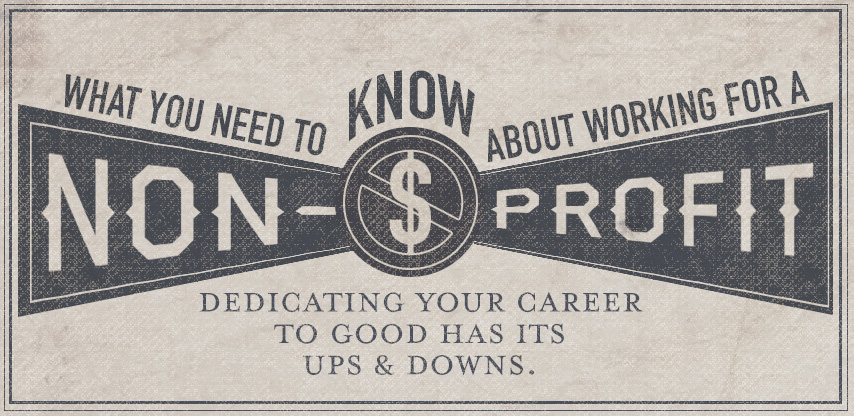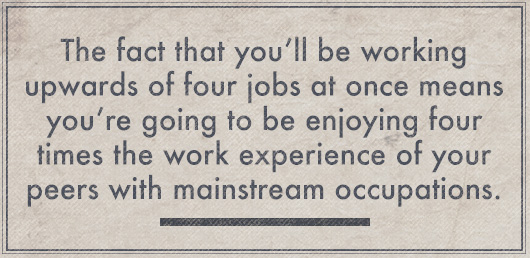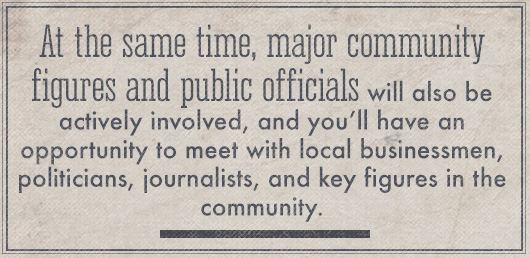One of the most common criticisms leveled at millennials is the claim that we’re selfish and shallow, and I’ve never been able to understand that. This is, after all, the generation which witnessed “going green” become a basic expectation, and which has made terms like “social justice” commonplace. For many of us, even in these lean economic times, it’s not enough for us to simply find a job which will support us–we want our work to have a positive impact on the world. The nonprofit sector is, as a result, targeted by many millennials as a way of meeting both of those needs.
While that’s certainly a noble pursuit, if you’re looking to start working for a nonprofit organization there are a few things you should probably be aware of first.
It’s Not For the Soft-Hearted
Too often, the people who I see trying to get into this kind of work state it’s because “they want to help people.” That’s a noble cause, don’t get me wrong, it’s just totally the wrong mentality to have when you’re in this kind of work. If your motivations are at all emotional you’re going to quickly find yourself miserable, worn out, or worse yet, left completely cynical and jaded by your experience.
What happens is that you’re going to be pouring your time, effort, and expertise into people who the odds are already pretty heavily stacked against. The simple fact of the matter is you will be disappointed–over and over. You’re going to have to deal with whatever comes your way, whether it’s an addict relapsing or a felon reoffending or a family not getting the support they need to make rent this month. I’m not saying you have to be a sociopath, you just have to be made of pretty stern stuff.
You’re also going to quickly learn the irrefutable truth that you just can’t help anyone who doesn’t want to be helped. If your motivations are coming from the wrong place, you’re going to wind up exhausting yourself trying to make a difference in the lives of people who either aren’t willing or aren’t yet ready to put in the same effort that you are. And of course, if you have trouble telling people “no” you’re going to be both taken advantage of by people who are gaming the system (they are out there) and do a disservice to those who need to be pushed to become independent. If you’re the kind of person who needs to be needed then customer service might be a better fit.
There Is So Much Paperwork
Due to our culture’s crippling fear that a starving homeless man somewhere might be given a dollar he wasn’t entitled to, the non-profit world is heavily regulated. Every conversation you have with a client will need to be summarized. Any resource you need will have to be approved by five people before you get it and signed off on by ten after you do.
Say you’re working in a warehouse which stocks donated furniture and household items for incoming refugee families. You’re going to be needing to record all incoming donations in your files, record ‘em in the organization’s files, record them in a file for the state and/or federal government, and then record them once more to make sure the first three files all match up. If you’re planning on delivering the donations somewhere, well, there’s paperwork for whatever you’re taking out, the mileage, the time it takes you to move everything–and let’s not forget the regular paperwork you’ll be keeping on the truck and any and all equipment in the warehouse you’re working with. Of course, this isn’t counting all the normal regulations associated with warehouse work–making sure everyone operating the forklifts is licensed to do so, making sure everyone abides by OSHA regulations.
And again–that’s just for a manual labor job. If organization is a weak point for you, or if you’ve got issues with writing, understand that except in some extraordinary circumstance, there’s really no way to avoid it.
Your Job Description Will Change Four Times A Month
Nonprofits are understaffed and underfunded, even in the best of times, which means it typically falls to the workers to fill in the gaps whenever they show up. I’m a case worker dealing with the ex-felon population, but it’s not uncommon for me to substitute for the receptionist, help out with data entry, or even work as a busboy at organization fundraisers. Going into any job you’ll have to understand that what was described in the ad (or heck, the interview) is just the tip of the iceberg in terms of what will be expected of you, and this is certainly true of nonprofits. If you have a talent you will be called upon to use it. If there’s something you don’t know, you’ll be expected to learn it and fast.
You should also understand that while nonprofits (to some degree) have to be very much by-the-book, there’s still plenty of by-the-seat-of-your-pants chaos to be expected. This will be different depending on the nature of the work you’re doing, but you should be at least prepared for interruptions to your 9-to-5 schedule. Whether it’s representing the organization at a local resource fair, helping put together some project for the media, or pitching in with a community partner, there’s a strong chance you’ll be getting out of the office a few times a month (though ideally, you’ll be compensated for this in either gas reimbursement or time off). Again, there’s almost certainly going to be a shortage of hands–be ready to be called upon.
It Might Not Be Permanent
Nonprofits are typically funded through either donations or government grants (or some combination of the two). Regardless of which, you’re probably going to be dealing with what’s called a “program year”–the time you’re given to meet certain goals set so that you can (hopefully) get a new round of funding and keep on serving the public. The idea is to keep nonprofits accountable both to the population they’re working with and the people or agencies who fund them, but what it means for you is that you don’t necessarily know if you’ll have a job twelve months from now.
You might think you can just shrug something like that off, but you do need to consider the full implications of that kind of uncertainty. Any kind of long-term planning becomes purely speculation and budgeting, especially if you have major payments such as student loans, becomes an absolute nightmare.
If you happen to married to someone with a steadier job, or if you’ve got a good support network, then you can get around this issue–if not, you can expect to be pinching every penny to build up enough of a buffer to support yourself if your organization doesn’t get funded (or funded enough to keep you on).
And In Spite Of All That, It’ll Still One Of The Best Opportunities You’ll Ever Have
As much as it might sound like I’m bashing this kind of work, I really and truly wouldn’t change it for the world. Is it rough? Absolutely. In content alone the whole nonprofit sector probably makes up some of the most challenging and stressful work there is, but it also offers some of the best rewards.
The fact that you’ll be working upwards of four jobs at once means you’re going to be enjoying four times the work experience of your peers with mainstream occupations. With one of the greatest challenges facing millennials in today’s job market being “lack of experience”, as tough as it can get, you will emerge in a year or two miles ahead of where most other people will be in twice that time. Dealing with a scant resume will never be an issue again, I assure you.
The ever-changing nature of most nonprofit work, as well as the chronic understaffing, will also mean that you’re going to be constantly presented with chances to learn on the job. Grant writing, teaching, data-entry, customer service, presentations, community outreach, event planning, public relations, statistics–wherever you’re looking to expand or whatever you’re looking to develop, all you have to do is ask to learn it and your co-workers will be more than happy to oblige and have someone to share the burden with.
And last, but certainly not least, nonprofit work offers almost unparalleled opportunities for networking.
You’ll be constantly finding yourself trying to feed a crowd of 5,000 with five loaves of bread and a couple of fish, and even when things are going well you should still expect to be short on resources. As a result, nonprofits tend to be decent about communicating with each other–building off of each other’s services to create the best network for their clients. An organization offering job assistance will probably refer their clients out to an organization offering assistance with housing who will in turn send them along to a food bank. At the same time, major community figures and public officials will also be actively involved, and you’ll have an opportunity to meet with local businessmen, politicians, journalists, and key figures in the community. Sure, most any job will give you a chance to sharpen your networking skills, but where else but in nonprofits will you be given the opportunity to make connections with such major people?
Again, is it easy work? No. Well-paying work? Not even a little.
But if you can stick with it, and learn from the curveballs that’ll be thrown at you (and they will be), then there’s not a job in the world you won’t be able to handle.
















![It’s Time to Begin Again: 3 Uncomfortable Frameworks That Will Make Your New Year More Meaningful [Audio Essay + Article]](https://www.primermagazine.com/wp-content/uploads/2025/01/begin_again_feature.jpg)

